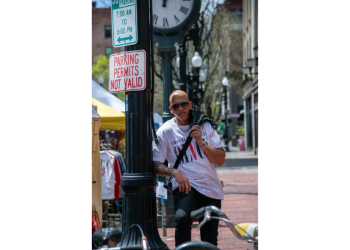But Chief Justice John G. Roberts Jr. chose not to address those or any other controversies in his annual “Year-end Report on the Federal Judiciary,” issued Saturday. Instead, he focused on a high mark of the judiciary’s past — a federal district judge’s efforts to implement school desegregation at Little Rock’s Central High School after the Supreme Court’s landmark 1954 decision in Brown v. Board of Education.
“The law requires every judge to swear an oath to perform his or her work without fear or favor, but we must support judges by ensuring their safety,” Roberts wrote in his nine-page report. “A judicial system cannot and should not live in fear. The events of Little Rock teach about the importance of rule by law instead of by mob.”
Roberts thanked Congress for recently passing the Daniel Anderl Judicial Security and Privacy Act, named for the son of New Jersey District Judge Esther Salas. Anderl was murdered in 2020 when he answered the door to their home in what was meant to be an attack on the judge.
The legislation allows judges to shield on the internet certain personal information about themselves and their families, such as home addresses, some financial information and employment details of their spouses. It has an exception for media reporting, but some transparency groups have worried that broad interpretation of the law could inhibit watchdog efforts.
Roberts also commended “the U.S. Marshals, Court Security Officers, Federal Protective Service Officers, Supreme Court Police Officers, and their partners” for “working to ensure that judges can sit in courtrooms to serve the public throughout the coming year and beyond.”
That’s about as close as Roberts came in his 18th report to commenting on the present day. The chief justice and other conservative members of the court have seen protesters outside their homes since the May leak of a draft opinion in Dobbs v. Jackson Women’s Health Organization, in which a majority of the court overturned Roe v. Wade’s federal guarantee of abortion rights.
A California man is facing attempted assassination charges after being arrested outside the suburban Maryland home of Justice Brett M. Kavanaugh with weapons and a plan to break into the justice’s house.
Roberts announced an investigation of the leak of the draft Dobbs opinion in the spring, just days after it was published in Politico, calling it a “singular and egregious breach of … trust that is an affront to the court and the community of public servants who work here.”
He directed Supreme Court Marshal Gail A. Curley to investigate the leak, saying that “to the extent this betrayal of the confidences of the Court was intended to undermine the integrity of our operations, it will not succeed.”
But Roberts has not publicly mentioned the investigation since then. Last summer, Justice Neil M. Gorsuch said the justices were expecting reports from Roberts about the work, but nothing has been exposed beyond leaked accounts of disagreements among justices and their clerks about attempts to examine cellphone records.
It is only one controversy to engulf the court. Several media outlets reported on what a former antiabortion evangelical leader said were efforts to encourage conservative justices to be bold in decisions regarding the procedure. Justice Samuel A. Alito Jr. denied a specific allegation from Rev. Rob Schenck to the New York Times that the justice or his wife disclosed to conservative donors the outcome of a pending 2014 case regarding contraceptives and religious rights.
Congressional leaders demanded the court investigate, but Roberts through a legal counsel said there was little to probe after both Alito and the person to whom he was alleged to have given the information denied it.
Congressional Democrats have also questioned whether efforts by Virginia “Ginni” Thomas encouraging state legislators and White House officials not to give up on efforts to reverse the 2020 presidential election results — reported by The Washington Post and others — should prompt her husband, Justice Clarence Thomas, to recuse himself from litigation related to that issue.
Those legislators have demanded the court create a more formal code of conduct to deal with such questions.
Three years ago, Justice Elena Kagan told a congressional committee that the justices were “very seriously” looking at the question of whether to have a Code of Judicial Conduct that’s applicable only to the U.S. Supreme Court. But beyond Roberts saying such decisions should be made by the judicial branch alone, the chief justice has passed up the chance to be specific about plans.
Some thought the chief justice might return to such matters in his annual message, released by tradition on New Year’s Eve.
Instead, Roberts highlighted the courage of Judge Ronald N. Davies, brought in from North Dakota to preside over efforts to desegregate Little Rock’s Central High School over the objections of Arkansas Gov. Orval Faubus.
The bench from which Davies presided will be brought to the Supreme Court in 2023 as part of an exhibit about the court’s role in school desegregation and specifically the efforts of Thurgood Marshall, who argued Brown and later became the first Black Supreme Court justice.
“The authentic bench will give visitors an opportunity to transport themselves in place and time to the events in Little Rock of 65 years ago,” Roberts wrote. “The exhibit will introduce visitors to how the system of federal courts works, to the history of racial segregation and desegregation in our country, and to Thurgood Marshall’s towering contributions as an advocate before he became a Justice.”
























